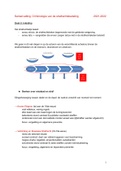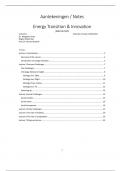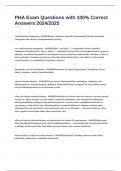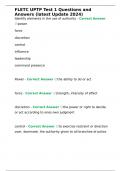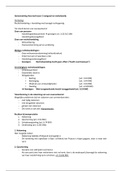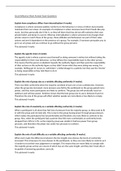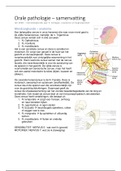MGH4004: Governing Health in a Global Context
Lectures
Introduction & Lecture 01 – Carijn Beumer, Gonnie Klabbers 04-09-2023
Glocal: Examples of how global and local health problems are connected
- Draught, floods, poverty, scarcity and rising food prices
- Local gender relations and for instance abortion of female foetuses affect demographics and
population health
- Global covid pandemic - different local consequences
- Emerging drug resistance, AMR, re-emerging infectious diseases, pandemics, poverty related
diseases
- Environmental change: ecocide, natural disasters, climate change (deforestation)
- Covid-19, obesity, malnourishment, war, global energy and food crisis, environmental
change, deforestation are all connected
o All have an independent effect on/relation to human health
o All also have an intertwined effect on/relation to human health
o Global interconnectedness as an accelerator
o Global and growing national inequalities worsening outcomes for specific groups
(inequality)
o Never waste a good crisis? Political economy and neoliberalist ideology
An economy is never neutral. Our political economic systems are based on
capitalism and highly ideological and individualistic.
- Malnutrition: fast food as well as too little food, too little nourishments
Major discourses:
- Lifestyle and neoliberalist (individual responsibility)
o Victim blaming
- Socialist (governmental responsibility)
o Creating victims, paternalistic
Global health is about understanding complexities resulting from interacting global-local-biological-
social-economic-political dimensions of disease. This includes critical assessment of current
actors/action, categories and tools (who developed them, what are underlying reasoning and norms,
do they fit complex contexts, what do they do to that context?). It’s about assessing categories and
boundaries.
Covid-19 led to an increased malnourishment by 118 million people (+10% of the world’s
population). This was caused by transport problems/supply chain problems as well as by a rise in
prices of food.
Biodiversity loss and ecoysystem health
The ongoing Covid-19 pandemic has important links to biodiversity loss and ecosystem health.
- Anthropogenic activities driving zoonotic disease emergence and extend to the pandemic
affecting biodiversity conservation, environmental policy, ecosystem services, and multiple
conservation facets.
- This could lead to having more new pandemics
We need to examine:
- Rules, norms, institutions and organizations that govern health
- Health policy and practice at national, regional, local and global levels
1
,Image slide ‘decolonisation and cultural sensitivity’
Lecture 02 Globalization & Health: Defining Globalization – Carijn Beumber 07-09-2023
History (globalization is as old as the empires vs. it started later on, in the 1980’s)
- Persian empire 550BC-330BC
- Mongol empire 1279-1303 (>25% of the world population lived here)
- Large empires with global influence: britisch, mongol, russian, qing dyasty, spanish
Globalization is NOT (Scholten):
- A new phenomenon starting only in the 1980’s
o Does not account for the older conceptions discussed
o Ignores historical interrelations and processes such as old empires (roman, aztec,
mongol, persian, etc.), colonialism
o As a form of human conscious experience, it IS new as a mass phenomenon
Some historical conceptions
- Humanism (13th-14thC)
o Renaissance, ethics, epistemology, knowledge by science (humanity is central,
replaces God)
o Enlightenment (scientific revolution)
- Cosmopolitanism (Kant 1724-1804)
o Equitable and respectful dialogue between peoples of the world, regardless of
differences. Fostered global conversation between different parts of the world.
- Weltgeist (Hegel 1770-1831)
o Connections of disparate areas
o Emerging consciousness of such connections
o All humanity as a kind of community
- Global village (McLuhan 1964)
o Mass media creates global frames of reference and shared knowledge between
people across the globe (info via television/newspapers/etc.)
- World-system theory (Wallerstein 1974)
o Intercontinental trade beginning in the 15 th century
o Development of division of labour on global scale (risks, having the world organized
in this way and countries reverting to the question whether they should be self-
sufficient in order to sustain a population)
o Inequality: Globe with core (rich countries), periphery (poor countries), semi
periphery (BRIC)
Scholte’s definitional discussion
- Internationalisation: between countries, people/goods/services/capital info/ideas, not
include deterritorialised global sphere
- Westernisation: cultural/legal/economic/political convergence to western/humanistic
principles, human rights, glocalization
- Liberalisation: anti-globalists oppose the effects of globalization, alterglobalisation
(deregulation/alterations/etc.)
o Economic liberalisation = privatisation, deregulation
- Universalism
- Economic imperialism: reduction of globalization to economic processes, non-western trade
and banking unions, western countries and neoliberalist economic ideology dominant now
but not necessarily in the future.
Stiglitz gives a definition of globalization slide
2
,Scholte (2008) definition of globalization: the global field is a SPACE in its own right. It is not just a
collection of smaller geographical regions, countries or localities. It is a distinct arena of social life.
Globalization = a process of spread of transplanetary and supraterritorial connections
Examples of deterritorialization
- Disembedding
o Distance and location become less relevant
- Speed of communication and processes
o Time becomes ‘fluid’
- Networks become faster, denser, wider
- Fading boundaries
o Global problems (climate change, biodiversity loss, pandemic, refugees)
o National/international governance is not sufficient
Eriksen (2014): glocalisation
Globalization is NOT the same as the current neoliberal ideological paradigm that dominates
globalization. The way we govern globalization is a political choice, not an economic given. Economic
globalization outpaced political globalization. Economic paradigm/liberalism has become the
governing centre of globalization (Stiglitz, 2008).
International institutions have undemocratic governance
- Lack transparency and accountability
- Legitimacy of international institutions is weakened
- Lobbying of corporate interests is strong
Improve globalization (Stiglitz, 2008)
- Collaboration (war, trade, environmental crises, pandemics)
- Increased recognition for rule if international law to improve limited power (financial crisis,
Paris Agreement CC, energy/livelihood crisis)
- Democratic (and undemocratic) forces of change call attention to (global) governance
deficiencies (protests)
Video ‘the multiplication of perspectives: the planetary… Masco’ https://www.youtube.com/watch?
v=1JDwBCdzlbE&ab_channel=ContactCmap
The planetary concept
- Emerges from the toxicity produced by the industrially producing regions
- Emerges from the damage and injury inflicted by the industrial toxicity
- Emerges from the technology that was developed to measure that industrial toxicity (NASA,
CO2 emissions changing globally etc.)
Anthropocene: planetary sphere that we created, toxic, new era in geology
The great acceleration = Greater population, CO2, Methane, Temperature, Tropical forest loss, Etc.
Planetary thinking is often still dichotomised (north/south, developed/underdeveloped,
people/nature, etc.)
Is it time to reassess our relation with nature (bbc) slide video
3
, https://www.youtube.com/watch?v=5gWGP34-4tY&ab_channel=BBCIdeas
https://www.youtube.com/watch?v=xlGnve1cjOY&ab_channel=HotMess
Lecture 03 Globalization & a historical perspective on Global Health - Remco van de Pas 11-09-2023
Permacrisis = a long period of great difficulty, confusion, or suffering that seems to have no end.
Globalization is inequitable
- It’s a space, but different from the place where we live and different perspectives as a result
of the place where we live. To get to a shared perspective, much is needed.
Globalization as internalisation, liberalization, universalization, and westernization (Slide 8)
- Redundant according to some authors (Scholte, 2008), because all factors come together.
There’s a pushback against globalization, because it causes a lot of damage as well. The
nationalist identity populist politics we see at the moment, is a pushback against this
globalization phenomena since we’ve seen since the fall of the wall (Berlin).
Putative migration waves out of Africa
Migration is inherent to human development and expansion. Human Sapiens originate from Africa.
The Roman empire: a common system
Over thousands of years, agricultural societies increased. More need to govern societies as to sustain
them. Governing large political geographical areas/global health, is not something new.
- In Roman times, a large part of now Europe was being governed by different provinces as
being part of the Roman empire, where trade was extensive. Around 2000 years ago, there
was vast trade of products and people across lands. With military force, this empire had to
be protected against those who wanted to invade it etc.
Spreading of the bubonic plague (pest/black death) (1346-1353)
With the expansion of trade also came an expansion of pathogens. Originated from Asia, 20% of the
population died in Europe. Side effect of trade and migration. Roman empire imploded.
Most relevant for the current era is what’s now referred to as ‘colonization’ for material and cultural
reasons. Moving across the Atlantic to have access to goods which weren’t available in Europe, and
expand trade. This led to an increase in trade of goods, but also an increase in pathogens once again
in the Americas (influenza, smallpox, etc. for which Europeans were already immune).
- Decline of indigenous population (80%, 1492-1650)
- Agricultural exchange
- Introduction of the horse
- Plantations and slave labour
Global Corporate Player = VoC (16th century)
Colonization and triangular trade
Development and wealth that came to Europe in the 16 th/17th century has been a result of slave
trade from Western Africa over the Atlantic Ocean to the Caribbean. This is where our wealth was
created. It was justifiable because there was an understanding that Africans were deemed of lesser
worth and could be made slaves and work on the plantations in the Americas.
- Inequalities in health care across different populations now can still be traced back to the
inequities that were than created. A class issue resulting from colonial expansion.
Followed by mass migration 1815-1930
Modern biomedical science came from different aspects
- Roman aqueducts and sanitation infrastructure
4
Lectures
Introduction & Lecture 01 – Carijn Beumer, Gonnie Klabbers 04-09-2023
Glocal: Examples of how global and local health problems are connected
- Draught, floods, poverty, scarcity and rising food prices
- Local gender relations and for instance abortion of female foetuses affect demographics and
population health
- Global covid pandemic - different local consequences
- Emerging drug resistance, AMR, re-emerging infectious diseases, pandemics, poverty related
diseases
- Environmental change: ecocide, natural disasters, climate change (deforestation)
- Covid-19, obesity, malnourishment, war, global energy and food crisis, environmental
change, deforestation are all connected
o All have an independent effect on/relation to human health
o All also have an intertwined effect on/relation to human health
o Global interconnectedness as an accelerator
o Global and growing national inequalities worsening outcomes for specific groups
(inequality)
o Never waste a good crisis? Political economy and neoliberalist ideology
An economy is never neutral. Our political economic systems are based on
capitalism and highly ideological and individualistic.
- Malnutrition: fast food as well as too little food, too little nourishments
Major discourses:
- Lifestyle and neoliberalist (individual responsibility)
o Victim blaming
- Socialist (governmental responsibility)
o Creating victims, paternalistic
Global health is about understanding complexities resulting from interacting global-local-biological-
social-economic-political dimensions of disease. This includes critical assessment of current
actors/action, categories and tools (who developed them, what are underlying reasoning and norms,
do they fit complex contexts, what do they do to that context?). It’s about assessing categories and
boundaries.
Covid-19 led to an increased malnourishment by 118 million people (+10% of the world’s
population). This was caused by transport problems/supply chain problems as well as by a rise in
prices of food.
Biodiversity loss and ecoysystem health
The ongoing Covid-19 pandemic has important links to biodiversity loss and ecosystem health.
- Anthropogenic activities driving zoonotic disease emergence and extend to the pandemic
affecting biodiversity conservation, environmental policy, ecosystem services, and multiple
conservation facets.
- This could lead to having more new pandemics
We need to examine:
- Rules, norms, institutions and organizations that govern health
- Health policy and practice at national, regional, local and global levels
1
,Image slide ‘decolonisation and cultural sensitivity’
Lecture 02 Globalization & Health: Defining Globalization – Carijn Beumber 07-09-2023
History (globalization is as old as the empires vs. it started later on, in the 1980’s)
- Persian empire 550BC-330BC
- Mongol empire 1279-1303 (>25% of the world population lived here)
- Large empires with global influence: britisch, mongol, russian, qing dyasty, spanish
Globalization is NOT (Scholten):
- A new phenomenon starting only in the 1980’s
o Does not account for the older conceptions discussed
o Ignores historical interrelations and processes such as old empires (roman, aztec,
mongol, persian, etc.), colonialism
o As a form of human conscious experience, it IS new as a mass phenomenon
Some historical conceptions
- Humanism (13th-14thC)
o Renaissance, ethics, epistemology, knowledge by science (humanity is central,
replaces God)
o Enlightenment (scientific revolution)
- Cosmopolitanism (Kant 1724-1804)
o Equitable and respectful dialogue between peoples of the world, regardless of
differences. Fostered global conversation between different parts of the world.
- Weltgeist (Hegel 1770-1831)
o Connections of disparate areas
o Emerging consciousness of such connections
o All humanity as a kind of community
- Global village (McLuhan 1964)
o Mass media creates global frames of reference and shared knowledge between
people across the globe (info via television/newspapers/etc.)
- World-system theory (Wallerstein 1974)
o Intercontinental trade beginning in the 15 th century
o Development of division of labour on global scale (risks, having the world organized
in this way and countries reverting to the question whether they should be self-
sufficient in order to sustain a population)
o Inequality: Globe with core (rich countries), periphery (poor countries), semi
periphery (BRIC)
Scholte’s definitional discussion
- Internationalisation: between countries, people/goods/services/capital info/ideas, not
include deterritorialised global sphere
- Westernisation: cultural/legal/economic/political convergence to western/humanistic
principles, human rights, glocalization
- Liberalisation: anti-globalists oppose the effects of globalization, alterglobalisation
(deregulation/alterations/etc.)
o Economic liberalisation = privatisation, deregulation
- Universalism
- Economic imperialism: reduction of globalization to economic processes, non-western trade
and banking unions, western countries and neoliberalist economic ideology dominant now
but not necessarily in the future.
Stiglitz gives a definition of globalization slide
2
,Scholte (2008) definition of globalization: the global field is a SPACE in its own right. It is not just a
collection of smaller geographical regions, countries or localities. It is a distinct arena of social life.
Globalization = a process of spread of transplanetary and supraterritorial connections
Examples of deterritorialization
- Disembedding
o Distance and location become less relevant
- Speed of communication and processes
o Time becomes ‘fluid’
- Networks become faster, denser, wider
- Fading boundaries
o Global problems (climate change, biodiversity loss, pandemic, refugees)
o National/international governance is not sufficient
Eriksen (2014): glocalisation
Globalization is NOT the same as the current neoliberal ideological paradigm that dominates
globalization. The way we govern globalization is a political choice, not an economic given. Economic
globalization outpaced political globalization. Economic paradigm/liberalism has become the
governing centre of globalization (Stiglitz, 2008).
International institutions have undemocratic governance
- Lack transparency and accountability
- Legitimacy of international institutions is weakened
- Lobbying of corporate interests is strong
Improve globalization (Stiglitz, 2008)
- Collaboration (war, trade, environmental crises, pandemics)
- Increased recognition for rule if international law to improve limited power (financial crisis,
Paris Agreement CC, energy/livelihood crisis)
- Democratic (and undemocratic) forces of change call attention to (global) governance
deficiencies (protests)
Video ‘the multiplication of perspectives: the planetary… Masco’ https://www.youtube.com/watch?
v=1JDwBCdzlbE&ab_channel=ContactCmap
The planetary concept
- Emerges from the toxicity produced by the industrially producing regions
- Emerges from the damage and injury inflicted by the industrial toxicity
- Emerges from the technology that was developed to measure that industrial toxicity (NASA,
CO2 emissions changing globally etc.)
Anthropocene: planetary sphere that we created, toxic, new era in geology
The great acceleration = Greater population, CO2, Methane, Temperature, Tropical forest loss, Etc.
Planetary thinking is often still dichotomised (north/south, developed/underdeveloped,
people/nature, etc.)
Is it time to reassess our relation with nature (bbc) slide video
3
, https://www.youtube.com/watch?v=5gWGP34-4tY&ab_channel=BBCIdeas
https://www.youtube.com/watch?v=xlGnve1cjOY&ab_channel=HotMess
Lecture 03 Globalization & a historical perspective on Global Health - Remco van de Pas 11-09-2023
Permacrisis = a long period of great difficulty, confusion, or suffering that seems to have no end.
Globalization is inequitable
- It’s a space, but different from the place where we live and different perspectives as a result
of the place where we live. To get to a shared perspective, much is needed.
Globalization as internalisation, liberalization, universalization, and westernization (Slide 8)
- Redundant according to some authors (Scholte, 2008), because all factors come together.
There’s a pushback against globalization, because it causes a lot of damage as well. The
nationalist identity populist politics we see at the moment, is a pushback against this
globalization phenomena since we’ve seen since the fall of the wall (Berlin).
Putative migration waves out of Africa
Migration is inherent to human development and expansion. Human Sapiens originate from Africa.
The Roman empire: a common system
Over thousands of years, agricultural societies increased. More need to govern societies as to sustain
them. Governing large political geographical areas/global health, is not something new.
- In Roman times, a large part of now Europe was being governed by different provinces as
being part of the Roman empire, where trade was extensive. Around 2000 years ago, there
was vast trade of products and people across lands. With military force, this empire had to
be protected against those who wanted to invade it etc.
Spreading of the bubonic plague (pest/black death) (1346-1353)
With the expansion of trade also came an expansion of pathogens. Originated from Asia, 20% of the
population died in Europe. Side effect of trade and migration. Roman empire imploded.
Most relevant for the current era is what’s now referred to as ‘colonization’ for material and cultural
reasons. Moving across the Atlantic to have access to goods which weren’t available in Europe, and
expand trade. This led to an increase in trade of goods, but also an increase in pathogens once again
in the Americas (influenza, smallpox, etc. for which Europeans were already immune).
- Decline of indigenous population (80%, 1492-1650)
- Agricultural exchange
- Introduction of the horse
- Plantations and slave labour
Global Corporate Player = VoC (16th century)
Colonization and triangular trade
Development and wealth that came to Europe in the 16 th/17th century has been a result of slave
trade from Western Africa over the Atlantic Ocean to the Caribbean. This is where our wealth was
created. It was justifiable because there was an understanding that Africans were deemed of lesser
worth and could be made slaves and work on the plantations in the Americas.
- Inequalities in health care across different populations now can still be traced back to the
inequities that were than created. A class issue resulting from colonial expansion.
Followed by mass migration 1815-1930
Modern biomedical science came from different aspects
- Roman aqueducts and sanitation infrastructure
4


